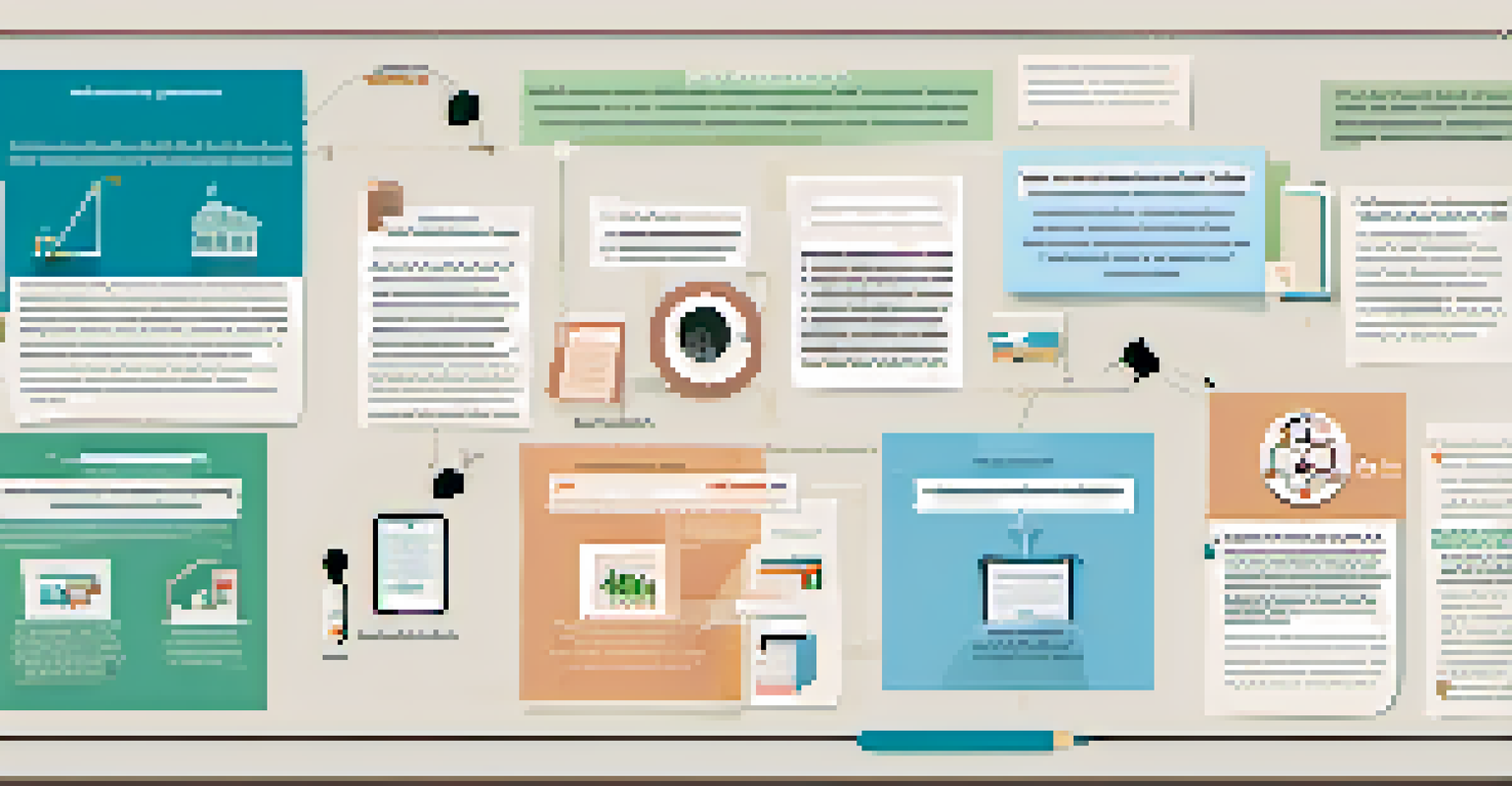Best Practices for Writing a Research Proposal in Medicine

Understand the Purpose of Your Research Proposal
A research proposal serves as a roadmap for your study, outlining your objectives and methodologies. It's essential to clearly articulate what you aim to investigate and why it matters. This ensures your proposal resonates with reviewers who may not be familiar with your specific area of research.
The purpose of a proposal is to convince the reader that your research is worthwhile and that you have the necessary skills and knowledge to carry it out.
Think of your proposal as a story where you're the narrator guiding your audience through the significance of your research. Highlighting the problem you're addressing and its implications can help create a compelling narrative. Remember, clarity in purpose will capture the attention of your audience right from the start.
Additionally, a well-defined purpose can steer the direction of your research and keep you focused. By establishing a clear aim, you not only help others understand your work but also reinforce your commitment to pursuing meaningful scientific inquiries.
Conduct a Comprehensive Literature Review
Before embarking on your research, it's crucial to conduct a thorough literature review. This step helps you understand existing knowledge and identify gaps your research could fill. By examining previous studies, you can ensure your work builds on established findings rather than duplicating them.

Consider your literature review as a foundation for your proposal. It showcases your understanding of the field and demonstrates that your research question is relevant and timely. Moreover, referencing credible sources adds weight to your proposal, making it more persuasive to reviewers.
Define Research Purpose Clearly
A well-articulated purpose ensures your research proposal resonates with reviewers and maintains focus throughout your study.
Incorporating insights from your literature review helps frame your research in the context of ongoing discussions in the medical community. This not only validates your approach but also positions your study as a valuable contribution to the field.
Clearly Define Your Research Questions and Hypotheses
A strong proposal includes well-defined research questions and hypotheses, guiding your investigation. These elements should stem from your literature review, pinpointing exactly what you intend to explore. Clarity in your questions ensures that your research remains focused and manageable.
A research proposal is a plan that outlines your research objectives and methods, and it serves as a guide for your study.
Think of your research questions as the compass for your study; they direct your inquiry and help maintain your focus. Clearly articulated hypotheses will help you outline the expected outcomes of your research, providing a framework for analysis. This clarity not only aids your understanding but also helps reviewers assess the feasibility of your study.
As you formulate these questions, keep them concise and specific. Vague questions can lead to ambiguous findings, making it essential to hone in on the precise aspects you wish to investigate.
Choose the Right Methodology for Your Study
The methodology section of your proposal is where you outline how you plan to conduct your research. Choosing the right methods is crucial, as they need to align with your research questions and objectives. Whether you opt for qualitative, quantitative, or mixed-methods approaches, clarity in your methodology will bolster your proposal's credibility.
Consider your methodology as the blueprint for your research project; it details the steps you'll take to gather and analyze data. Just as a builder needs a solid plan to construct a house, you need a well-thought-out methodology to guide your research journey. Include details about your sample size, data collection techniques, and analysis methods.
Conduct a Thorough Literature Review
A comprehensive literature review helps identify gaps in existing research, showcasing your understanding and the relevance of your work.
Additionally, be prepared to justify your choices. Explaining why you selected certain methods over others enhances the strength of your proposal and reassures reviewers that your approach is well-considered.
Outline the Significance and Impact of Your Research
A compelling research proposal clearly articulates the significance of your study. Highlighting the potential impact of your findings can make your proposal more persuasive. Demonstrating how your research could influence patient care, healthcare policies, or further academic inquiry can capture the interest of reviewers.
Think of this section as your opportunity to advocate for your research. By addressing the broader implications of your work, you can illustrate its relevance to the medical community and society at large. This not only adds value to your proposal but also conveys your passion for making a difference.
Furthermore, emphasizing the significance of your research can help secure funding or institutional support. When stakeholders see the potential benefits, they are more likely to invest in your work.
Prepare a Realistic Timeline and Budget
A well-prepared timeline and budget demonstrate your organizational skills and awareness of project demands. This section should outline the key milestones of your research and the resources required to achieve them. A realistic timeline helps set expectations for both you and your reviewers, showcasing your ability to manage the project efficiently.
Consider creating a visual timeline to illustrate your project phases. This can provide a clear snapshot of your plan and make it easier for reviewers to grasp the scope of your work. Similarly, a detailed budget should itemize anticipated expenses, ensuring transparency and accountability.
Outline Significance and Impact
Highlighting the potential impact of your study can persuade reviewers and stakeholders of its value to the medical community.
Including a well-structured budget can also highlight your understanding of the financial aspects of conducting research. Reviewers often look for feasibility, and a thoughtful budget can reinforce their confidence in your proposal.
Revise and Seek Feedback Before Submission
Revision is a critical step in crafting a standout research proposal. After drafting your proposal, take the time to review and refine your content. This process allows you to identify inconsistencies, clarify language, and ensure that your proposal flows smoothly from one section to the next.
Consider seeking feedback from colleagues or mentors who can provide valuable insights. An external perspective can help highlight areas for improvement that you may have overlooked. Incorporating constructive criticism will enhance the overall quality of your proposal.

Finally, adhere to submission guidelines and formatting requirements. A polished, error-free proposal not only reflects professionalism but also shows respect for the reviewers' time and effort.